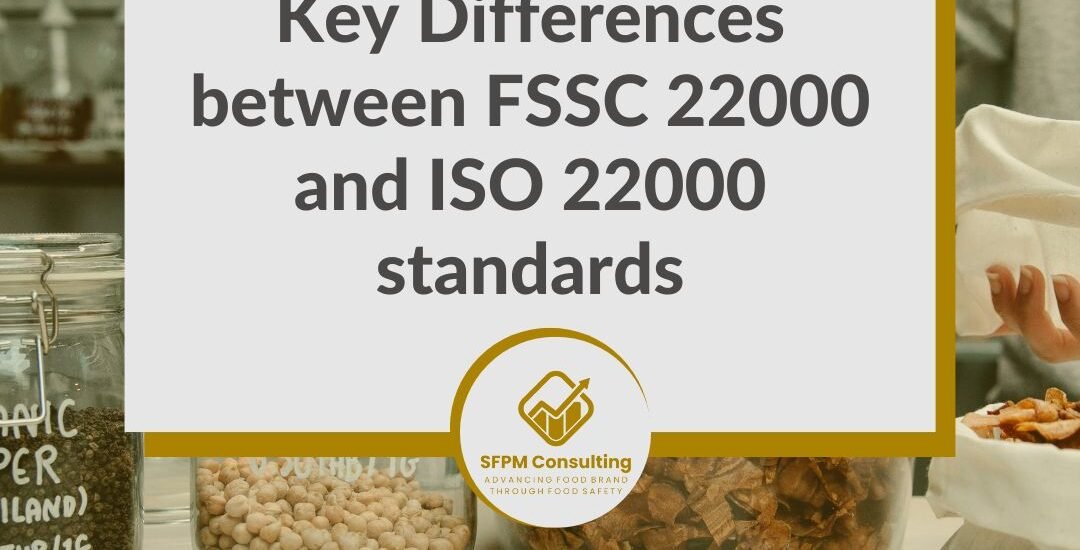Key differences between FSSC 22000 and ISO 22000 standards
- November 12, 2024
- Posted by: Felicia
- Category: Food Safety

Selling food in Asia or working with Asian clients?
Two of the most prominent standards in this domain are FSSC 22000 and ISO 22000. Both frameworks aim to enhance food safety management systems, but they differ in several key aspects. This blog post will delve into the differences between FSSC 22000 and ISO 22000, helping you understand which standard might suit your food manufacturing operations.
Understanding ISO 22000
ISO 22000 is an internationally recognized standard developed by the International Organization for Standardization (ISO). It specifies the requirements for a food safety management system (FSMS) and applies to all organizations in the food chain, from farm to fork. The primary goal of ISO 22000 to ensure that food products are safe for consumption by managing and reducing food safety hazards.
ISO 22000 integrates the principles of Hazard Analysis and Critical Control Points (HACCP) and includes interactive communication, system management, and prerequisite programs. It emphasizes a systematic approach to identifying, evaluating, and controlling food safety hazards and minimizing food safety risks.
Understanding FSSC 22000
The Food Safety System Certification (FSSC) 22000 is a certification scheme that builds upon the ISO 22000 standard. Developed by the Foundation for Food Safety Certification, FSSC 22000 is recognized by the Global Food Safety Initiative (GFSI) and provides a comprehensive framework for managing food safety risks.
FSSC 22000 includes the requirements of ISO 22000 and additional requirements specific to food manufacturing. These additional requirements encompass sector-specific prerequisite programs (Prerequisite Programs) and detailed specifications for food safety management systems. Including these extra elements makes FSSC 22000 more stringent and comprehensive, providing a higher level of assurance for food safety.
Key Differences Between FSSC 22000 and ISO 22000
While both standards aim to ensure food safety, there are several critical differences between FSSC 22000 and ISO 22000:
1. Scope and Recognition: ISO 22000 is a general standard applicable to all organizations in the food chain, whereas FSSC 22000 is specifically designed for food manufacturers and is recognized by the GFSI.
2. Additional Requirements: FSSC 22000 includes additional requirements beyond ISO 22000, such as sector-specific Prerequisite Programs and detailed specifications for food safety management systems.
3. Certification Process: The certification process for FSSC 22000 is more rigorous, involving a detailed audit of both ISO 22000 requirements and the additional FSSC 22000 requirements. This provides a higher level of assurance for food safety.
Benefits of Implementing ISO 22000
Implementing ISO 22000 offers several benefits for food manufacturing companies:
1. International Recognition: ISO 22000 is globally recognized, enhancing the credibility and marketability of your products.
2. Systematic Approach: The standard provides a systematic approach to managing food safety, ensuring that hazards are identified, evaluated, and controlled effectively.
3. Improved Communication: ISO 22000 emphasizes interactive communication, promoting better coordination and collaboration within the organization and with external stakeholders.
Benefits of Implementing FSSC 22000
FSSC 22000 offers additional benefits, making it an attractive option for food manufacturers:
1. GFSI Recognition: FSSC 22000 is recognized by the GFSI, providing a higher level of assurance for food safety and facilitating access to global markets.
2. Comprehensive Framework: Including sector-specific Prerequisite Programs and additional requirements ensures a more comprehensive approach to food safety management.
3. Enhanced Credibility: The rigorous certification process enhances the credibility of your food safety management system, building trust with customers and stakeholders.
Choosing the Right Standard for Your Organization
When deciding between FSSC 22000 and ISO 22000, consider the following factors:
1. Industry Requirements: Determine whether your industry or customers require GFSI-recognized certification. If so, FSSC 22000 may be the better choice. ISO 22000 is not GFSI-recognized.
2. Scope of Operations: Consider the scope of your operations and the specific food safety risks you face. FSSC 22000’s additional requirements may provide a more tailored approach to managing these risks.
3. Resource Availability: Assess the resources available for implementing and maintaining the certification. FSSC 22000 may require more resources due to its additional requirements and rigorous certification process.
FSSC 22000 and ISO 22000 are crucial in ensuring food safety in the food manufacturing industry. While ISO 22000 provides a solid foundation for food safety management, FSSC 22000 offers a more comprehensive and rigorous framework recognized by the GFSI.
By understanding the differences between these standards, you can decide which certification is best suited for your organization’s needs, ultimately enhancing your food safety management system and building trust with your customers.
